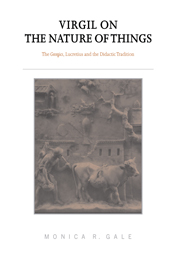Book contents
- Frontmatter
- Contents
- Preface
- List of abbreviations
- 1 Introduction: influence, allusion, intertextuality
- 2 Beginnings and endings
- 3 The gods, the farmer and the natural world
- 4 Virgil's metamorphoses: mythological allusions
- 5 Labor improbus
- 6 The wonders of the natural world
- 7 The cosmic battlefield: warfare and military imagery
- 8 Epilogue: the philosopher and the farmer
- Bibliography
- Index of passages cited
- General index
3 - The gods, the farmer and the natural world
Published online by Cambridge University Press: 15 October 2009
- Frontmatter
- Contents
- Preface
- List of abbreviations
- 1 Introduction: influence, allusion, intertextuality
- 2 Beginnings and endings
- 3 The gods, the farmer and the natural world
- 4 Virgil's metamorphoses: mythological allusions
- 5 Labor improbus
- 6 The wonders of the natural world
- 7 The cosmic battlefield: warfare and military imagery
- 8 Epilogue: the philosopher and the farmer
- Bibliography
- Index of passages cited
- General index
Summary
In the last chapter, I touched on two related themes which call for further discussion. I noted, firstly, that Virgil tends to open each book with a relatively optimistic and unproblematic view of the relationship between human beings and the gods, which is gradually complicated as the poem proceeds and a range of different perspectives is offered to the reader. Secondly, I looked briefly at the farmer's relationship with his environment, which I characterized as a struggle between order and chaos, human control and natural degeneration. In this chapter, I will suggest that the ambiguities and tensions inherent in Virgil's handling of the relationships between gods, human beings and their natural environment are closely related to his handling of his didactic models. The three main didactic intertexts – Hesiod, Aratus and Lucretius – have different and mutually incompatible world-views. For Lucretius, the imperfection of the world proves that the gods have no concern with human life; yet, though death and decay are inevitable, happiness is easy to attain, simply by accepting the world as it really is. Hesiod's picture is grimmer: though worshipping the gods will bring its rewards, endless toil is inescapable, and success can be attained only through hard work. For Aratus, on the other hand, Zeus is a kindly father, akin to the Stoic pronoia (providence),and the universe is systematic and orderly. Virgil's text allows each of these models to predominate in turn (particularly in book 1, where Hesiod and Aratus are most prominent), orchestrating their different voices in such a way as to emphasize the differences between them, rather than to produce a homogenous, unified whole.
- Type
- Chapter
- Information
- Virgil on the Nature of ThingsThe Georgics, Lucretius and the Didactic Tradition, pp. 58 - 112Publisher: Cambridge University PressPrint publication year: 2000



